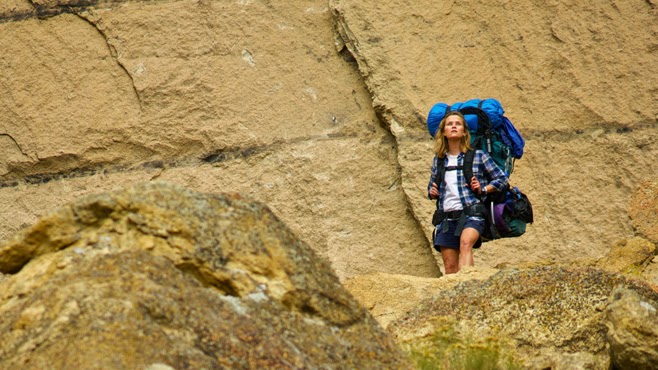or
You'll Never Walk Alone
As you get older, you realize that you run the risk of walking a grooved track, well-worn and familiar. You can, literally, get yourself in a rut. The more you walk it, the deeper, you go—that is, the groove in the trail gets deeper, you don't necessarily go farther. The longer you walk it, the deeper it becomes, and you lose the perspective of the path, and it only gets harder to get out of it. The resolution is to find a different path, fresh yet unfamiliar, to go forward and to get where you need to go.
I've done some hiking (so I'm an expert for this movie, right?) and even gone on a pilgrimage or two. Even if you're walking with a group, it's a solitary exercise, making you aware of your surroundings, but, more profoundly, of yourself. You become more aware, often painfully, of your body on the journey. Each step, of the thousands you make, giving you feedback on how you're doing, updating you about your condition, the muscles in your legs, the blisters on your feet, the grooves in your shoulders made by the burden you carry. Mentally, you carry burdens, too, that in your solitude with no ability to confront them, you let them go. The mind fills with memories, stray thoughts, snippets of song and life that un-spool, keeping you company on the long journey of the path and the mind.
Wild, the new film by Jean-Marc Vallée (who made last year's The Dallas Buyer's Club) captures more than any movie I've seen the parallel tracks of road and mind that you encounter when you walk alone. Based on the memoir of Cheryl Strayed (née Nyland), it chronicles her (in the form of Reese Witherspoon, who also produced) taking on the Pacific Crest Trail after her life spiraled out of control following the death of her mother, Bobby (Laura Dern) at the age of 45.
We start at the low-point of the trip, at the top of a mountain. The view is gorgeous, awesome, intimidating. Cheryl's focus, however, is on her feet, specifically the right one. A too-loose pair of boots causes her feet to slide around in them, despite the cushioning of her dense socks. The toe-nail on her big toe is loose, so she makes the decision to pull it out (by comparison, it took James Franco 127 Hours—and 3/4 of that film to cut off his arm). The intense pain causes her to knock over her monstrous back-pack which kicks her boot—the right one, of course—into the ravine and out of sight. She freaks out, horrified, at the idea of retrieving it in bare feet. She screams at the Universe, then throws her other boot into the ravine, doubling her problem.
She probably could have saved herself a few hundred miles right there; she's got impulse control problems. In which case, every painful step she takes is a repudiation of her instincts.
The film starts there, then bounces back and forth in time and space along the trail (including the moments and life-choices that got her there). = Fleeting moments along the way recall the flashbacks and as she walks along snippets of song echo ghost-like in her head, along the lines of Springsteen's "Tougher Than The Rest," Wings' "Let 'Em In," "Homeward Bound," by Simon and Garfukle. The one that shows up the most is Los Incas' melancholy version of "El Condor Pasa," lyricised by Simon and Garfunkle to evoke want, basic life-choices and becoming. Apt choices—they make nice upbeat soundtracks for trudging in the dirt.
Wild keeps to a minimum the cliché of the shot looking-down-at-your-feet as you walk, instead there are many long shots held for a time as Witherspoon makes her way slowly through the frame. Memories of songs, overlayed by her vaporous accompaniment, the flashbacks bursting in with hard cuts to reveries of her mother, her life and death, and Cheryl's response by imploding her marriage with one-night stands followed by a heroin chaser, make up the bulk of the film. Stability crumbles, her foundation shatters, therapy is a joke, relationships disappear, and the only thing that lasts is a tattoo acquired in the divorce (to mark the occasion and her right shoulder). Then, just as quickly, we're back on the trail with another obstacle or encounter. The flashbacks are shot as a combination of recollection and impression, sparked by not-too-obvious cues (refreshingly). They're random and create a puzzle of influence as to why Cheryl went off the rails and one suspects (if one is to believe Nick Hornby's screenplay) it's because she focused on her mother's views in a moment of weakness, as opposed to her everyday wisdom. At one point, Cheryl says her mother is "the love of my life." Although Hornby never provides a moment of true epiphany, the realization that life needs to be taken in the macro, rather than the micro-incidental is articulated throughout. As Hemingway wrote: "There's no one thing that's true. It's all true." It's not the steps (or mis-steps) you take, but the journey that matters.
So, yes, you can throw your boots occasionally, but the important thing is that you keep walking, no matter which direction you find yourself going.
You'll get there.
 |
| Cheryl...Strayed |


.jpg)


No comments:
Post a Comment